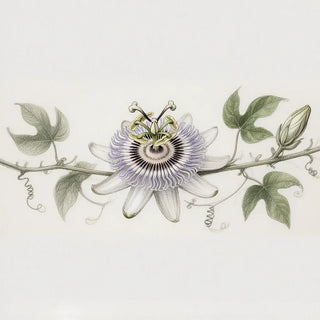Passionflower is famous in herbal medicine for its relaxing effect. It is commonly used to reduce stress thanks to its calming function. But despite its benefits, it is essential to take precautions.
Passiflora incarnata , known as passion flower , helps to achieve a deep sleep . It has sedative effects and natural calming properties. However, there are risks associated with using this plant. It is crucial to know what the possible dangers are.

- Allergic reactions are relatively rare side effects of passionflower .
- Decreased alertness is an undesirable effect of passionflower linked to its sedative properties.
- The recommended dose of passionflower infusion is 1 to 2 grams of dried leaves per 150 ml of boiling water.
- Passionflower cures are generally recommended for a maximum duration of four weeks.
- Passionflower is not recommended in cases of liver damage, during pregnancy and breastfeeding, or before the age of 12.
Benefits and Uses of Passionflower
Passionflower helps a lot to relax and find calm. It is great to help with difficulty falling asleep, fears, and even stress.
Passionflower for sleep
This plant has a great effect on our central nerve, improving our sleep. Tests have shown that it is useful before and after operations. To benefit from it, you can drink it as a herbal tea. You need about 2 grams of dried leaves for a cup, to be taken up to 4 times a day. Or, in powder, from 0.5 to 2 grams per dose, also up to 4 times a day works well. For those who prefer extracts, 2 ml at each dose, repeated three times a day, is the perfect dose.
Natural anxiolytic
Passionflower reduces agitation with its relaxing properties. This benefit is confirmed by several major health authorities, such as the EMA, ESCOP, and WHO. They endorse its use for several concerns, including worry, sleep disorders , agitation, and anxiety . In addition, studies have shown that it can be as effective as a benzodiazepine-type medication.
To better manage anxiety or stress , Passionflower can be mixed with other plants. It is found in several forms, such as pills, capsules, or even in homeopathy.
There are alternatives to passionflower to combat sleep disorders, such as Chiric Sanango or the Deep Sleep kit, which are valuable aids in regaining restful sleep.
Dangers and Precautions with Passionflower
Passionflower is often well tolerated but some precautions should be taken. If you are allergic to the plant , it should not be taken. Allergic reactions are uncommon and usually mild. .
Passionflower (Passiflora incarnata) is often used as an herbal remedy for its calming and anxiolytic effects. However, it does have some potential dangers and side effects:
- Excessive drowsiness : Passionflower may cause excessive drowsiness, which may affect the ability to drive or use machines.
- Drug interactions : It may interact with other sedatives, anxiolytics or drugs that depress the central nervous system, increasing the sedative effects and the risk of overdose. Do not drink alcohol if you are taking it and consult a professional before starting treatment.
- Gastrointestinal effects : Consumption of passionflower may cause nausea, vomiting, and gastrointestinal pain in some people.
- Allergic reactions : Although rare, allergic reactions can occur, manifesting with symptoms such as rash, itching or difficulty breathing.
- Liver toxicity : There are isolated reports of liver toxicity associated with long-term use of passionflower, although this is rare and requires further research to confirm this risk.
- Contraindications : Passionflower is not recommended for pregnant or breastfeeding women and for people with certain medical conditions without medical advice.
It is always recommended to consult a healthcare professional before using passionflower, especially if you are taking other medications or have pre-existing medical conditions.
Possible side effects
Side effects of passionflower are uncommon. They include nausea, digestive problems, and allergic reactions. Some people may experience nausea with a racing heart or allergic rhinitis. It can also make you sleepy, so be careful if you drive or operate machinery.
Drug interactions
Passionflower may interact with other medications. With some psychiatric medications, it may cause a lot of drowsiness. It may also react with blood thinners and herbs that affect the liver or nervous system.
FAQ
What are the dangers of Passionflower?
Passionflower is often well tolerated, but some precautions are necessary. Do not use it if you are allergic to this plant.
What are the benefits and uses of Passionflower?
Passionflower has properties that help to relax and calm down. It is recommended for mild sleep disorders (insomnia, difficulty falling asleep, waking up early), mild anxiety and its physical effects (such as digestive disorders and palpitations), and for stress.
How to use Passionflower for sleep?
Passionflower is known to help you fall asleep and improve sleep. It is used for its relaxing effects.
Can Passionflower be a natural anxiolytic?
Yes, passionflower has natural actions against anxiety . It helps alleviate symptoms, such as digestive disorders and palpitations.
What are the contraindications of Passionflower?
If you are allergic to passionflower, do not use it. Before taking it, especially if you are taking other medications, seek the advice of a healthcare professional. Interactions may occur.
What are the possible side effects of Passionflower?
Occasionally, although rare, passionflower can cause side effects. These include headaches, dizziness, and digestive problems. Consult a healthcare professional if these symptoms persist.
Are there any drug interactions with Passionflower?
Passionflower may interact with certain classes of medications. This includes anti-anxiety medications, antidepressants, and anti-epileptics. Be sure to talk with your doctor before using it.


the menopause diet 5 day plan to lose weight
“Really informative article! I’ve also been exploring the impact of nutrition on overall health and have written about similar topics on my blog Peak Health Insights. Thanks for explaining the digestive system so clearly!”